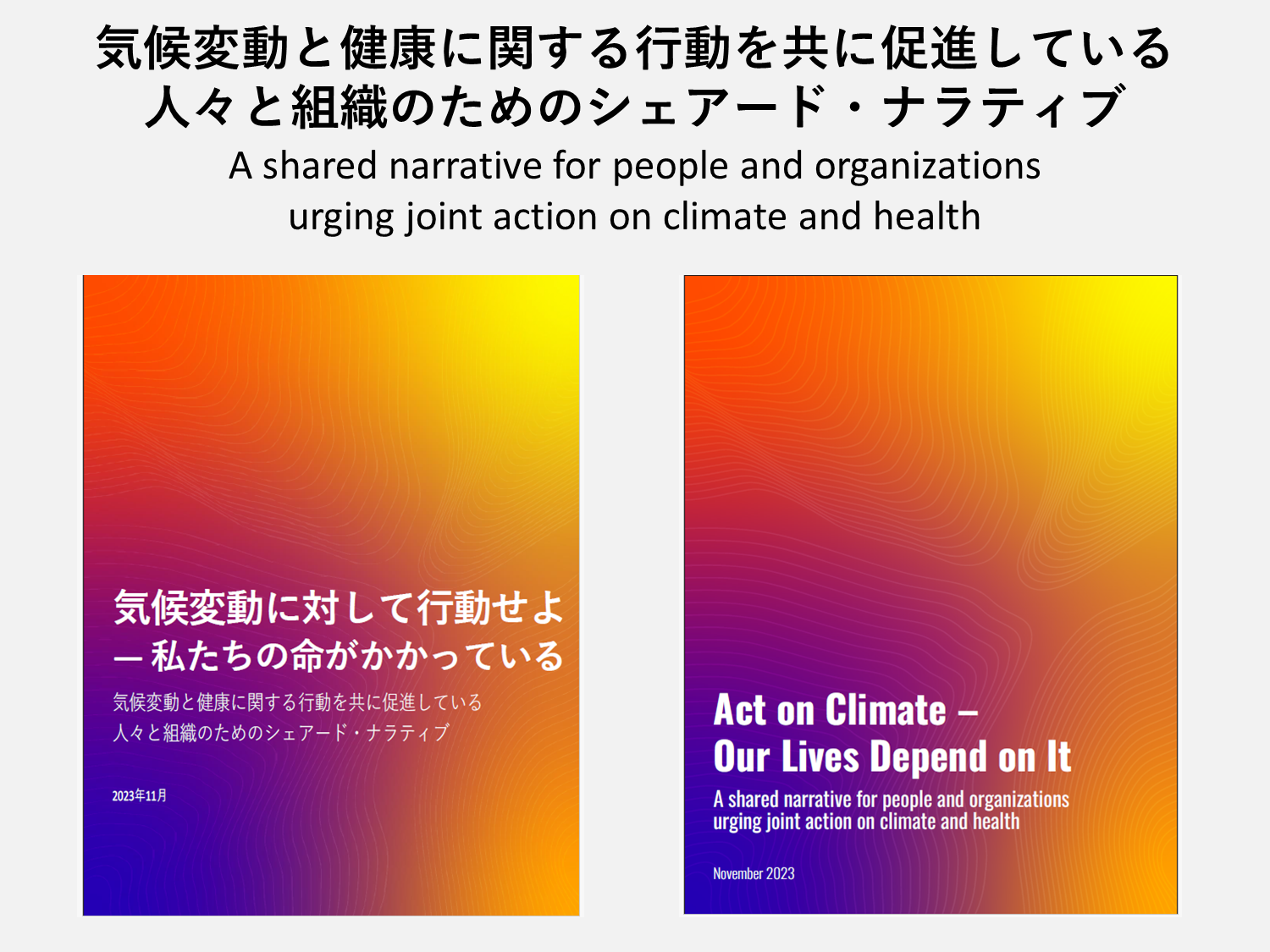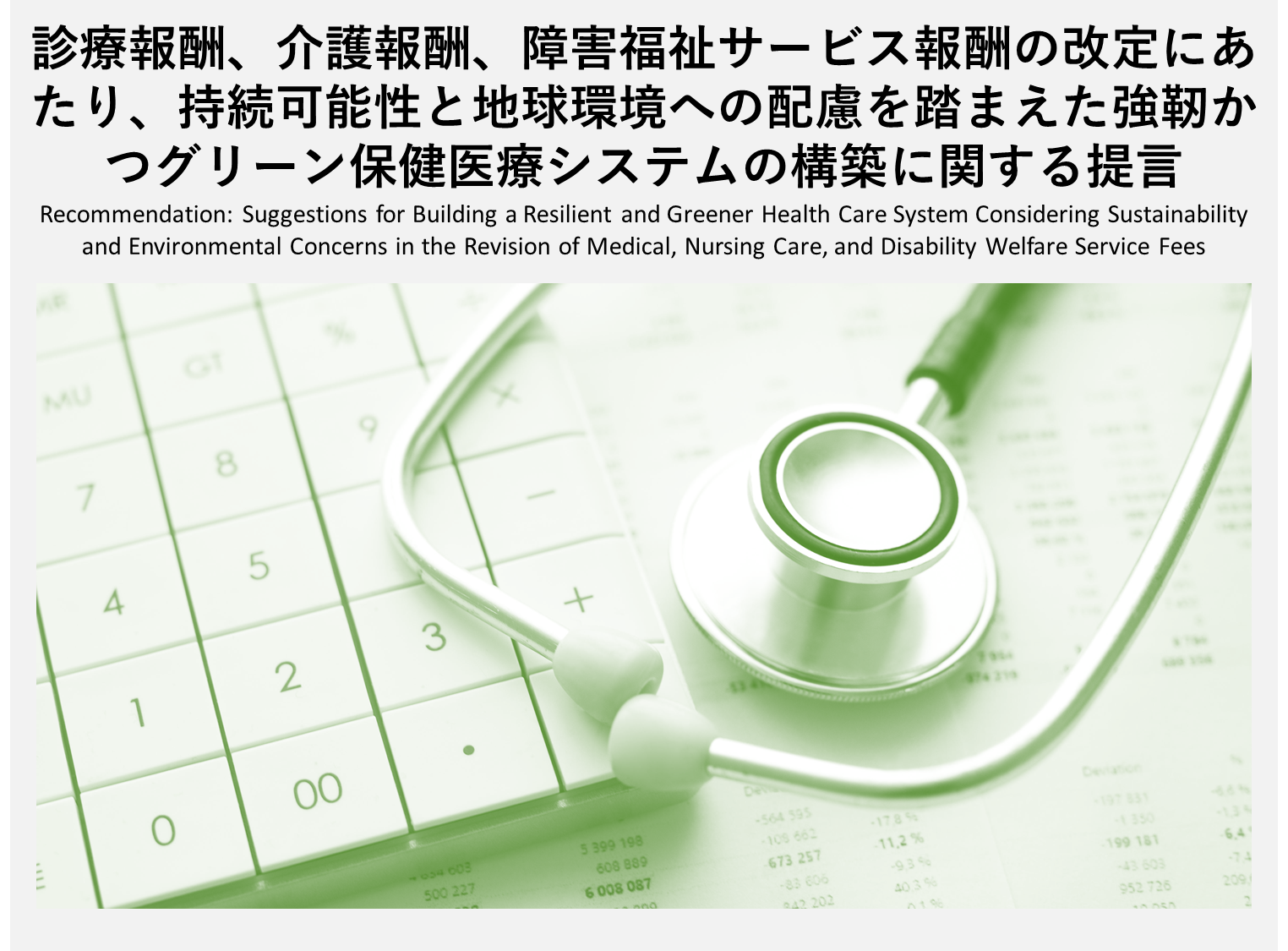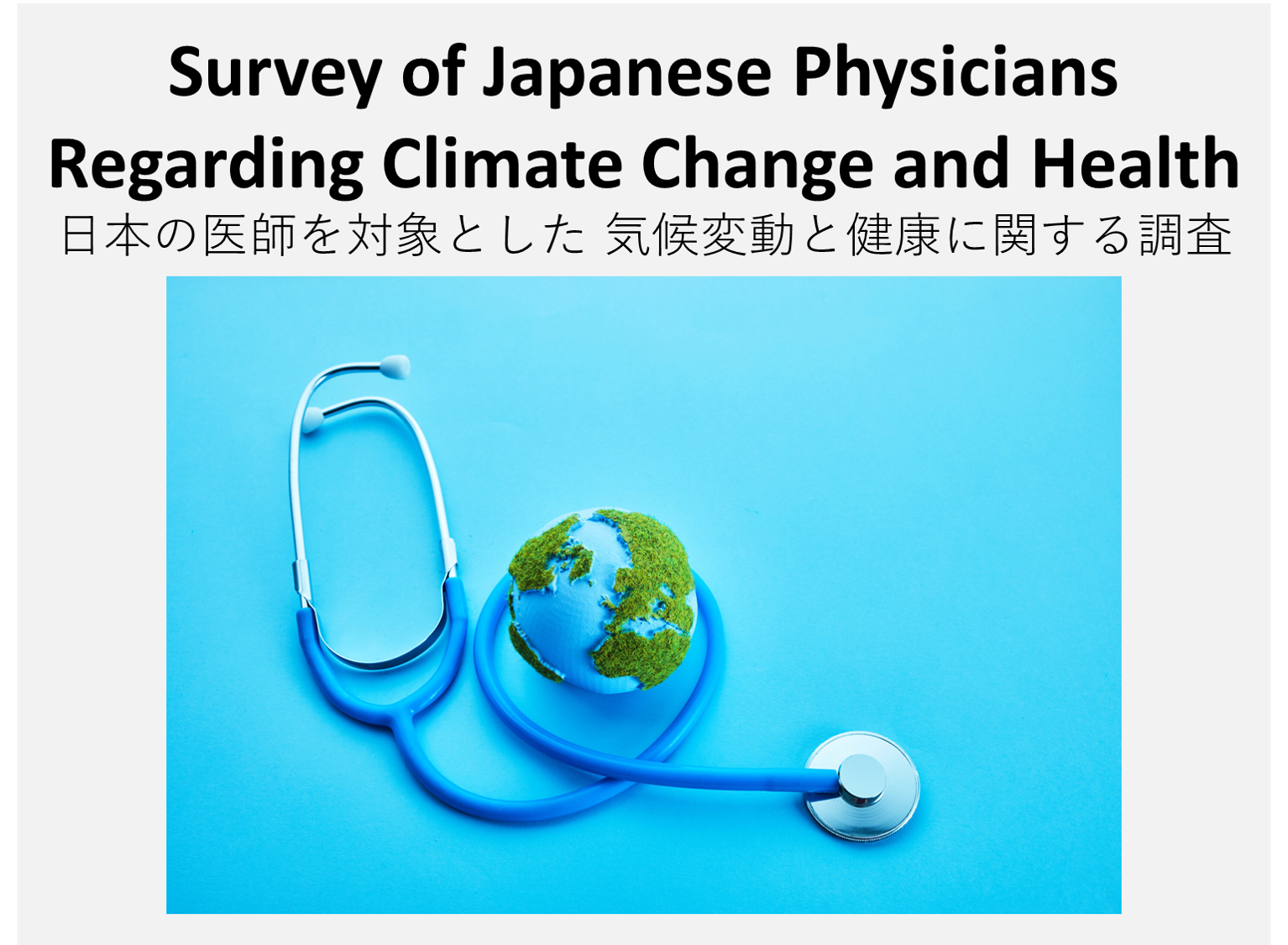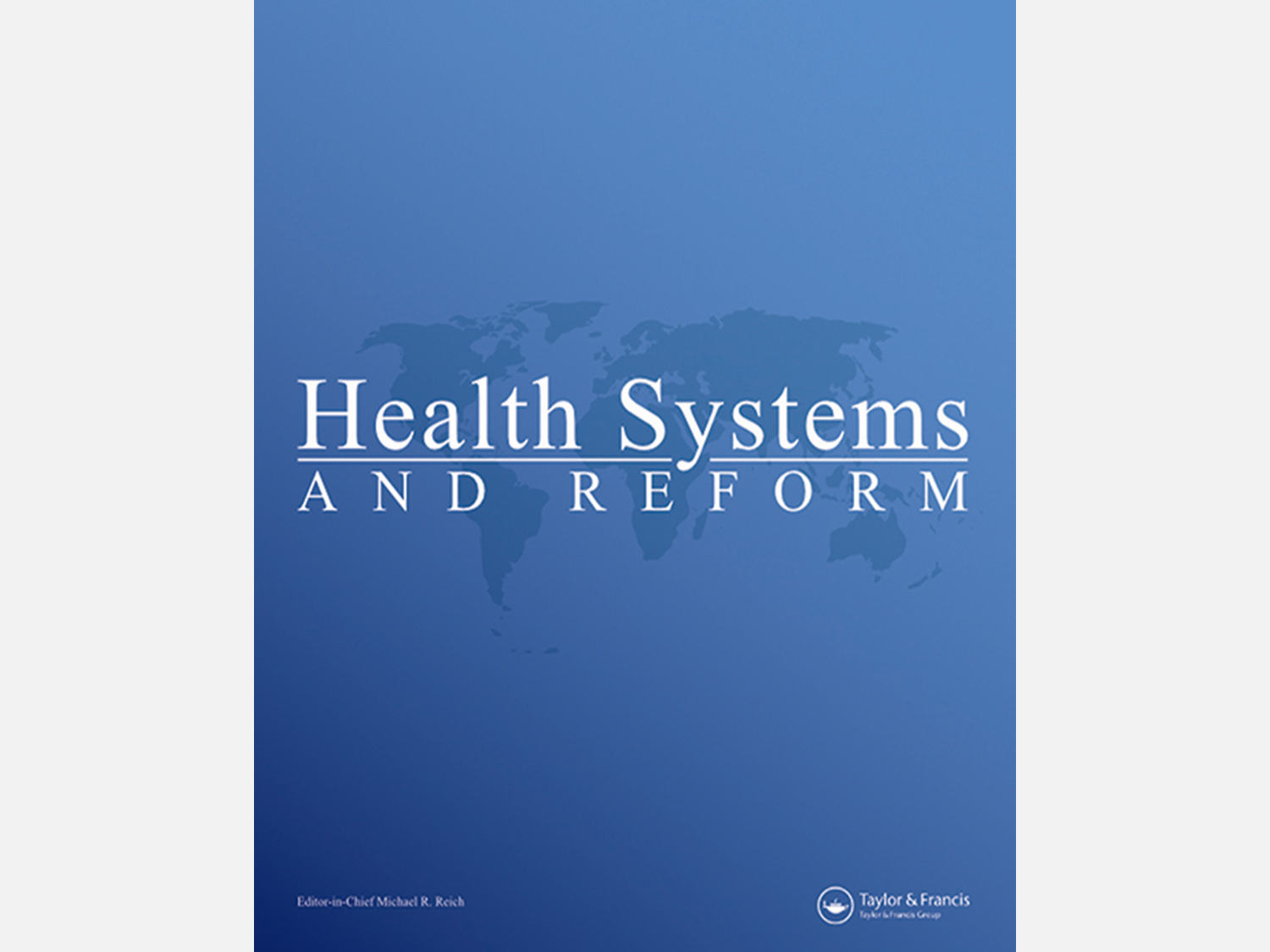[Event Report] Planetary Health Online Seminar – Towards a Healthier Planet: Integrated Strategies for Climate Change Mitigation/Adaptation and Public Health in National Health Systems (January 19, 2024)
date : 2/27/2024
Tags: Planetary Health
![[Event Report] Planetary Health Online Seminar – Towards a Healthier Planet: Integrated Strategies for Climate Change Mitigation/Adaptation and Public Health in National Health Systems (January 19, 2024)](https://hgpi.org/en/wp-content/uploads/sites/2/HGPI_240119_UKFR-eyecatch-1.jpg)
Health and Global Policy Institute (HGPI) hosted a Planetary Health Online Seminar, ” Towards a Healthier Planet: Integrated Strategies for Climate Change Mitigation/Adaptation and Public Health in National Health Systems,” on January 19, 2024.
In this webinar, we invited two guest speakers committed to national climate action strategies in the United Kingdom and France to introduce and discuss their pioneering efforts and national strategies for mitigation and adaptation to climate change in public health, respectively.
Key points of the lectures
- In the United Kingdom and France, the healthcare sector is currently responsible for 5-8% of annual greenhouse gas emissions, thus providing a large opportunity for green transformation.
- It is evident that climate change impacts the ability and effectiveness of healthcare services, with large scale weather events such as heat waves being the direct cause of additional deaths in recent years.
- The United Kingdom’s National Health Service (NHS) has committed to reaching net zero carbon with the target of eliminating directly controlled emissions by 2040 (NHS Carbon Footprint) and all emissions, including those embedded within the supply chain by 2045 (NHS Carbon Footprint plus).
- In 2022, France launched the “France Green National Plan” with the goal of reducing emissions by 5% per year and making the healthcare sector carbon neutral by 2050. The plan focuses on eight priority areas for action.
- International collaboration is a vital aspect of achieving sustainable healthcare, and both the United Kingdom and France have joined the World Health Organization’s Alliance for Transformative Action on Climate and Health (ATACH).
■ [English] Planetary Health Online Seminar – Towards a Healthier Planet (01:19:02)
■ Keynote Speech 1: Case Study from England, “Delivering a ‘Net Zero’ National Health Service”
Sarah Ouanhnon (Head of Net Zero Delivery and Partnerships, Greener NHS, NHS England)
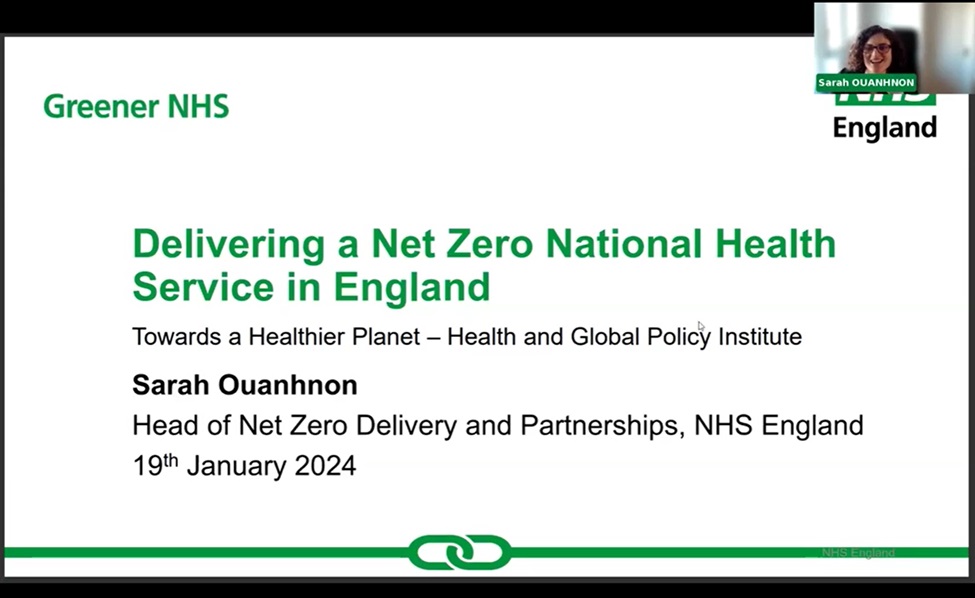
Background and National Strategy
The United Kingdom’s National Health Service (NHS) is a large publicly funded system encompassing approximately 230 hospitals and organisation including acute care, primary care consisting of 7,000 general practitioners (GPs), and works with over 80,000 medical suppliers. The UK’s healthcare sector makes up 4-5% of national annual emissions, and thus has a responsibility to consider the environmental impact and sustainability of the sector as a whole, given that climate change impacts the ability to deliver healthcare services, and climate itself has a direct impact on health. For example, periods of extreme heat in 2022 caused 3,000 excess deaths in patients over the age of 65 in the United Kingdom.
The NHS has committed to reaching net zero carbon with the target of eliminating directly controlled emissions by 2040 (the NHS Carbon Footprint) and all emissions, including those embedded within the supply chain by 2045 (the NHS Carbon Footprint plus). The national strategy is structured around ten key areas for action: estate and facilities, travel and transport, medicine, supply chain, food and nutrition, research and innovation, clinical transformation, digital, workforce engagement and adaptation.
These key areas were identified with the aim to fully embed the concept of net zero within the health system.
These key areas encourage action such as considering how to make medical facilities more energy efficient and increasing the use of renewable energy on site. Action around travel and transport considers the transportation of goods, patient transport including ambulances, and staff commute. The roadmap for travel and transport includes actionable steps such as converting the ambulance fleet to zero emission by 2040.
Medicine
Two groups of medicine were identified to have direct emissions and thus an area for improvement: anaesthetic gases and metered dose inhalers which together make up 5% of all NHS carbon emissions. The previously commonly administered anaesthetic gas desflurane has significantly higher emissions while not having significant benefits over other anaesthetic gases. Thus, one actionable step that was implemented was the shift by anaesthesiologists to using lower emission gases such as isoflurane. The result showed a rapid reduction in emissions from anaesthetic gases between 2018 to 2023. Similarly, inhalers used for asthma, chronic obstructive pulmonary disease (COPD) and other illnesses represent 3% of the NHS emissions, and most patients can use dry powder medication which is as effective, if not better, than metered dose inhalers. Having these environment-prompted conversations provides an opportunity to improve patient care.
Medicines and chemicals as a broader group also contribute 20% of emissions through the different stages of the manufacturing process and supply chain before direct use by medical staff. To address this, the NHS is working on understanding where along the supply chain emissions are created, reducing waste byproducts and over prescription, and working with pharmacies (the Royal Pharmaceutical Society) to create a shared understanding of how a greener pharmacy can be achieved.
Procurement
The NHS Net Zero Supplier Roadmap creates a step-by-step guide for suppliers to better understand and start visualising the goals and steps required to achieve net zero emissions. From 2027 onwards, all suppliers for the NHS will be required to publicly report targets, emissions and publish a Carbon Reduction Plan. In connection to this is the idea of sustainable procurement, and as part of a circular economy considers the ‘5 Rs’: reduce, reuse, reprocessed, renewable, and recyclable. This can be implemented in the production of protective gear, medical devices and surgical instruments.
Low carbon care
Patients experience the medical care system as pathways, and because green healthcare is a fundamental part of high-quality healthcare, it is important to care for patients in an efficient and low carbon setting. This involves a shift towards preventative care, which prioritises the prevention of disease and thus ultimately reduces the need for treatment further down the road.
Systemic change allows the medical work force to more effectively integrate the values of a green health system, and all NHS trusts and Integrated Care Boards (ICBs) now have a ‘Green Plan’ which is a 3-5 year plan around how priority actions can be implemented. The NHS also understands the importance of having data-driven action, and actively tracks relevant key indicators. Finally, international collaboration is a vital aspect of achieving sustainable healthcare, and the UK is part of ATACH and other collaborative efforts to standardise and create greener healthcare standards.
■ Keynote Speech 2: Case Study from France, “Roadmap Ecological Planning of the Healthcare System”
Hélène Gilquin (Project Manager, French Ministry of Health)
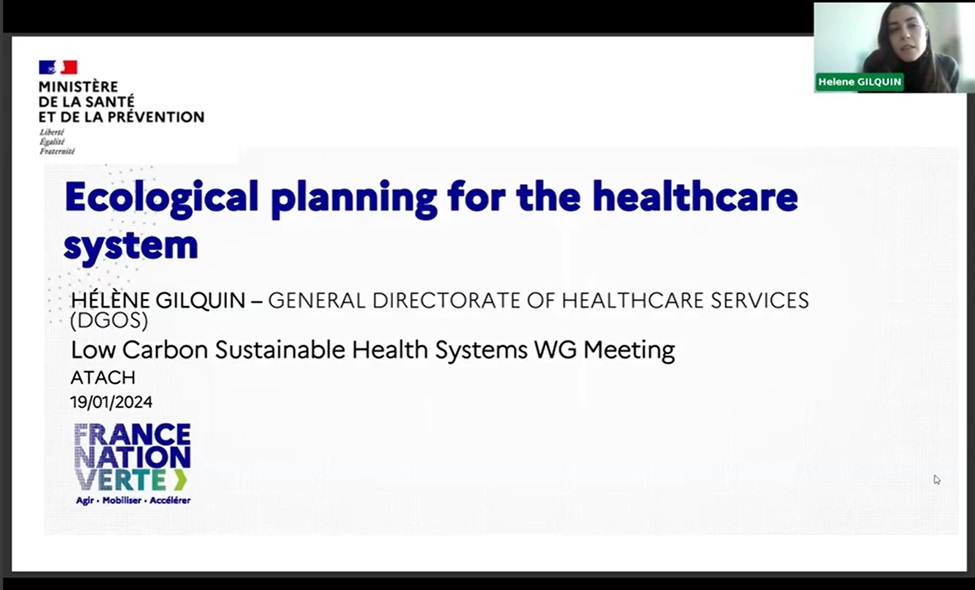
Background and National Strategy
The healthcare sector is responsible for 8% of France’s greenhouse emissions, with approximately half being generated by the pharmaceutical and medical device sectors. Annually, 700,000 tonnes of waste are generated, and around 1,000L of water is consumed per patient per day. On the ground actors have actively worked for many years to launch regional ecological initiatives, even before the French government’s official roadmap was published. An example of this is several maternity units which have already implemented eco-responsible practices.
In October 2022, the French Prime Minister announced the creation of the “France Green National Plan”. The Ministry of Health established an interdepartmental task force to lead the green reform, and the first meeting was held in May 2023 to inform the entire health sector about the publication of the roadmap. A second meeting in December 2023 announced new measures to evaluate healthcare products and institutions.
The government’s goal is to reduce emissions by 5% per year and ultimately make the healthcare sector carbon neutral by 2050, focusing on eight priority areas for action. The eight priority areas are: achieving carbon neutrality by 2050, building renovation, decarbonisation of healthcare products and industries, sustainable purchasing, eco-responsible care, waste minimisation and recovery, training and research, sustainable mobility and transport, and greener digital healthcare.
Examples of actions in line with these priorities include a carbon calculation methodology which is being developed to assign a score based on ecological impact that can be used to compare products. A similar methodology is also in development to assess medical devices. The French government has also launched an online sustainable purchasing platform to support and encourage buyers towards the use of sustainable products. Additionally, ‘eco-responsible care’ is relatively new concept which the French government is working to define while ensuring that the quality of medical care is not compromised. This can include the reprocessing of single-use medical devices or reducing the amount of medicine prescribed to patients.
Three high-impact measures
Three measures in particular have been highlighted for their high-impact potential in improving the healthcare system. First, a community of 150 new Energy and Ecological Transition Advisors in healthcare was formed in September 2022 to guide local government strategies. They will also be involved in the use of the carbon footprint measurement tool for products and devices.
Second, since July 2023, managers of public health institutions have received free training with an emphasis on raising awareness about ecological issues and the development of appropriate strategies.
Lastly, between 2024 and 2026, the French government will experiment with the reprocessing of single-use medical devices that have high environmental impacts. While this change has long been feared in the health sector for the inherent health risks, this experiment will potentially pave the way for the authorisation of these reprocessed devices.
The French government is well aware of the need to place the country within the comprehensive framework of health, and that care of the planet directly prevents new diseases while promoting better overall health.
■ Closing Remarks
Kiyoshi Kurokawa (Chairman, Health and Global Policy Institute)
This was a lively and productive discussion that reveals how complex the challenge of mitigating climate change in healthcare is. While the several years of COVID-19 brought to light many topics surrounding sustainability in health, improving health systems require the collaboration and efforts of many parties.
I will personally be traveling to Paris to join an OECD discussion around the implementation of AI in healthcare. Health systems vary between countries and the way different health needs are addressed provides an opportunity for multiple models of health care to emerge. It is important to learn from the models of care in other countries when considering how to improve the domestic healthcare system in Japan, and today’s presentations have been a great chance to hear various perspectives.
[Event Overview]
- Date & Time: Friday, January 19, 2024; 18:30-19:55 (Japan)/10:30-11:55 (France)/9:30-10:55 (UK)
- Format: Online (Zoom Webinar)
- Participation Fee: Free
- Languages: Japanese and English, with simultaneous interpretation
- Organizer: Health and Global Policy Institute (HGPI)
- Co-organizer: The Embassy of France in Japan, The British Embassy Japan, National Graduate Institute for Policy Studies (GRIPS) Global Health Innovation Policy Program (GHIPP)
[Program] (Titles omitted)
18:30-18:35 Explanation of Objectives
Joji Sugawara (Vice President, Health and Global Policy Institute)
18:35-18:40 Opening Remarks
Masakazu Hamachi (State Minister of Health, Labour and Welfare)
18:40-19:05 Keynote Speech 1: Case Study from England “Delivering a ‘Net Zero’ National Health Service”
Sarah Ouanhnon (Head of Net Zero Delivery and Partnerships, Greener NHS, NHS England)
19:05-19:30 Keynote Speech 2: Case Study from France “Roadmap Ecological Planning of the Healthcare System”
Hélène Gilquin (Project Manager, the French Ministry of Health)
19:30-19:50 Expert Comments and Q&A Session
19:50-19:55 Closing Remarks
Kiyoshi Kurokawa (Chairman, Health and Global Policy Institute)
■Profile:
Masakazu Hamachi (State Minister of Health, Labour and Welfare)
 Born May 8, 1970, in Fukuoka Prefecture. After graduating from the Faculty of Law at Waseda University in March 1994, he joined UBS Securities Japan Co., Ltd. in April of the same year. In April 1997, he moved to a major condominium development and sales company. Hamachi passed the national examination for Judicial Scriveners in November 2002 and the national bar examination in November 2006. He registered as an attorney in September 2008 and then embarked on a political career. He was first elected to the House of Representatives (HR) in the 46th General Election in December 2012. He was reelected in the 47th General Election in December 2014 and served as the Parliamentary Vice-Minister for Foreign Affairs in the 3rd Abe Reshuffled Cabinet in October 2015. In October 2016, Hamachi became the Director of the National Security Division and Representative of the Fukuoka Prefectural Headquarters for Komeito, as well as the Director of the Committee on National Security in the HR. He was reelected to the HR in the 48th General Election in October 2017. In March 2017, he served as the Director of the Committee on Foreign Affairs in the HR. In October 2018, he became the Director of the Judicial Affairs Division for Komeito and Director of the Committee on Judicial Affairs in the HR in November of the same year. He was appointed Chief Secretary of the Research Commission on the Constitution and the Research Commission on Foreign Affairs and National Security for Komeito in October 2019. In October 2020, Hamachi took up the roles of Director of the International Affairs Bureau for the International Affairs Committee of Komeito, Director of the Special Committee on North Korean Abductions and Other Issues, and Director of the Committee on Budget in the HR. He was reelected to the HR in the 49th General Election in October 2021 and subsequently became the Deputy Chair of the Diet Policy Committee for Komeito, a Member of the Central Secretariat for Komeito, and the Director of the Committee on Rules and Administration in the HR in November 2021. In September 2023, he was appointed the State Minister of Health, Labour, and Welfare in the Kishida Cabinet.
Born May 8, 1970, in Fukuoka Prefecture. After graduating from the Faculty of Law at Waseda University in March 1994, he joined UBS Securities Japan Co., Ltd. in April of the same year. In April 1997, he moved to a major condominium development and sales company. Hamachi passed the national examination for Judicial Scriveners in November 2002 and the national bar examination in November 2006. He registered as an attorney in September 2008 and then embarked on a political career. He was first elected to the House of Representatives (HR) in the 46th General Election in December 2012. He was reelected in the 47th General Election in December 2014 and served as the Parliamentary Vice-Minister for Foreign Affairs in the 3rd Abe Reshuffled Cabinet in October 2015. In October 2016, Hamachi became the Director of the National Security Division and Representative of the Fukuoka Prefectural Headquarters for Komeito, as well as the Director of the Committee on National Security in the HR. He was reelected to the HR in the 48th General Election in October 2017. In March 2017, he served as the Director of the Committee on Foreign Affairs in the HR. In October 2018, he became the Director of the Judicial Affairs Division for Komeito and Director of the Committee on Judicial Affairs in the HR in November of the same year. He was appointed Chief Secretary of the Research Commission on the Constitution and the Research Commission on Foreign Affairs and National Security for Komeito in October 2019. In October 2020, Hamachi took up the roles of Director of the International Affairs Bureau for the International Affairs Committee of Komeito, Director of the Special Committee on North Korean Abductions and Other Issues, and Director of the Committee on Budget in the HR. He was reelected to the HR in the 49th General Election in October 2021 and subsequently became the Deputy Chair of the Diet Policy Committee for Komeito, a Member of the Central Secretariat for Komeito, and the Director of the Committee on Rules and Administration in the HR in November 2021. In September 2023, he was appointed the State Minister of Health, Labour, and Welfare in the Kishida Cabinet.
Sarah Ouanhnon(Head of Net Zero Delivery and Partnerships in the Greener NHS Programme at NHS England)
 Sarah has led a variety of large-scale change programmes to optimise delivery of care in primary, acute and community care settings. Building on her expertise in population health management, she has also helped support the design of more integrated care across settings. For the past 10 years Sarah has worked for a range of organisations within care provision, the pharmaceutical industry and consulting, in the UK and the French healthcare systems. Keen to address the threat that climate change poses to population health and to tackle growing health inequalities, Sarah joined the Greener NHS programme in January 2021, where she leads the delivery of the NHS net zero commitment across Supply Chain and Medicines. Her recent work includes the implementation of the NHS policy for high quality low carbon respiratory care, the development and implementation of the NHS Net Zero Supplier Roadmap, outlining requirements of NHS suppliers for the next ten years and the collaboration with the WHO and other healthcare systems to accelerate the decarbonisation of global healthcare supply chains.
Sarah has led a variety of large-scale change programmes to optimise delivery of care in primary, acute and community care settings. Building on her expertise in population health management, she has also helped support the design of more integrated care across settings. For the past 10 years Sarah has worked for a range of organisations within care provision, the pharmaceutical industry and consulting, in the UK and the French healthcare systems. Keen to address the threat that climate change poses to population health and to tackle growing health inequalities, Sarah joined the Greener NHS programme in January 2021, where she leads the delivery of the NHS net zero commitment across Supply Chain and Medicines. Her recent work includes the implementation of the NHS policy for high quality low carbon respiratory care, the development and implementation of the NHS Net Zero Supplier Roadmap, outlining requirements of NHS suppliers for the next ten years and the collaboration with the WHO and other healthcare systems to accelerate the decarbonisation of global healthcare supply chains.
Hélène Gilquin (Project Manager, the French Ministry of Health)
 Hélène Gilquin is a graduate of Sciences Po, where she obtained a master’s degree in government affairs. She joined the French Ministry of Health five years ago. Since November 2022, she has been in charge of the interministerial ecological transition plan for the healthcare system. The Hospitals Department, where she works, is in charge of steering and deploying the various commitments made by the Minister of Health in 2023 to reduce the sector’s greenhouse gas emissions by five percent a year. France’s healthcare sector accounts for over 8% of the country’s greenhouse gas emissions.
Hélène Gilquin is a graduate of Sciences Po, where she obtained a master’s degree in government affairs. She joined the French Ministry of Health five years ago. Since November 2022, she has been in charge of the interministerial ecological transition plan for the healthcare system. The Hospitals Department, where she works, is in charge of steering and deploying the various commitments made by the Minister of Health in 2023 to reduce the sector’s greenhouse gas emissions by five percent a year. France’s healthcare sector accounts for over 8% of the country’s greenhouse gas emissions.
Top Research & Recommendations Posts
- [Policy Recommendations] The Path to a Sustainable Healthcare System: Three Key Objectives for Public Deliberation (January 22, 2026)
- [Research Report] The 2025 Public Opinion Survey on Healthcare in Japan (March 17, 2025)
- [Research Report] Perceptions, Knowledge, Actions and Perspectives of Healthcare Organizations in Japan in Relation to Climate Change and Health: A Cross-Sectional Study (November 13, 2025)
- [Research Report] AMR Policy Update #4: Cancer Care and AMR (Part 1)
- [Policy Recommendations] Reshaping Japan’s Immunization Policy for Life Course Coverage and Vaccine Equity: Challenges and Prospects for an Era of Prevention and Health Promotion (April 25, 2025)
- [Research Report] The 2023 Public Opinion Survey on Satisfaction in Healthcare in Japan and Healthcare Applications of Generative AI (January 11, 2024)
- [Research Report] The 2026 Public Opinion Survey on Healthcare in Japan (February 13, 2026)
- [Public Comment Submission] “Assessment Report on Climate Change Impacts in Japan (Draft Overview)” (December 24, 2025)
- [Policy Recommendations] Developing a National Health and Climate Strategy for Japan (June 26, 2024)
- [Policy Recommendations] Mental Health Project: Recommendations on Three Issues in the Area of Mental Health (July 4, 2025)
Featured Posts
-
2026-01-09
[Registration Open] (Hybrid Format) Dementia Project FY2025 Initiative Concluding Symposium “The Future of Dementia Policy Surrounding Families and Others Who Care for People with Dementia” (March 9, 2026)
![[Registration Open] (Hybrid Format) Dementia Project FY2025 Initiative Concluding Symposium “The Future of Dementia Policy Surrounding Families and Others Who Care for People with Dementia” (March 9, 2026)](https://hgpi.org/en/wp-content/uploads/sites/2/dementia-20260309-top.png)
-
2026-02-05
[Registration Open] (Webinar) The 141st HGPI Seminar “Current Status and Future Prospects of Korea’s Obesity Policy: Voices of People with Lived Experience in Policy Promotion” (March 3, 2026)
![[Registration Open] (Webinar) The 141st HGPI Seminar “Current Status and Future Prospects of Korea’s Obesity Policy: Voices of People with Lived Experience in Policy Promotion” (March 3, 2026)](https://hgpi.org/en/wp-content/uploads/sites/2/hs141-top-1.png)




